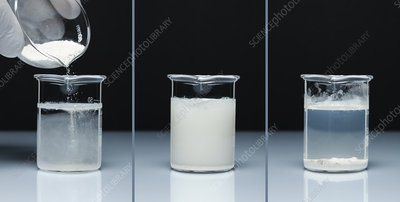Blog
Is Calcium Carbonate Soluble in Water? | Solubility Explained
Is Calcium Carbonate Soluble in Water?
Calcium carbonate is a common chemical compound with the formula CaCO₃. Found in materials like limestone, marble, and chalk, it’s widely used in industries ranging from construction to pharmaceuticals. But the question arises: is calcium carbonate soluble in water? Understanding the solubility of calcium carbonate is crucial for applications in various fields, including medicine, environmental science, and engineering.
Understanding Solubility: Is Calcium Carbonate Soluble in Water?
To answer the question “is calcium carbonate soluble in water,” we first need to understand what solubility means. Solubility refers to the ability of a substance to dissolve in a solvent, typically water. A substance is considered soluble if it dissolves to form a homogeneous solution. However, calcium carbonate is known for its low solubility in water, making it only slightly soluble.
Chemical Explanation: Why Is Calcium Carbonate Insoluble in Water?
The reason why calcium carbonate is not readily soluble in water lies in its chemical structure. Calcium carbonate is an ionic compound composed of calcium ions (Ca²⁺) and carbonate ions (CO₃²⁻). When it comes into contact with water, the calcium ions have a strong attraction to the carbonate ions, making it difficult for water molecules to break these bonds and dissolve the compound.
However, under certain conditions, such as the presence of carbon dioxide (CO₂), calcium carbonate can become more soluble. The reaction between calcium carbonate and carbon dioxide forms calcium bicarbonate, which is more soluble in it:
CaCO3+CO2+H2O→Ca(HCO3)2\text{CaCO}_3 + \text{CO}_2 + \text{H}_2\text{O} \rightarrow \text{Ca(HCO}_3)_2CaCO3+CO2+H2O→Ca(HCO3)2
This reaction is particularly relevant in natural water bodies where limestone formations can gradually dissolve over time.
Environmental Impact: Is Calcium Carbonate Soluble in Water in Nature?
In nature, the solubility of calcium carbonate plays a significant role in shaping landscapes. For example, the formation of caves and underground rivers often results from the gradual dissolution of calcium carbonate in water containing dissolved carbon dioxide. This process, known as chemical weathering, contributes to the unique geological formations seen in karst landscapes.
Understanding whether calcium carbonate is soluble in water is also important in environmental science. The slightly soluble nature of calcium carbonate means that it can act as a buffer in natural waters, neutralizing acids and maintaining the pH balance of aquatic ecosystems.

Practical Applications: How Solubility Affects Calcium Carbonate Use
The question “is calcium carbonate soluble in it?” is not just of academic interest; it has practical implications in various industries. In construction, for example, calcium carbonate is used as a building material in the form of limestone and marble. Its low solubility ensures that it remains stable and durable over time, making it an ideal material for buildings and monuments.
In the pharmaceutical industry, calcium carbonate is used as an antacid to relieve heartburn and indigestion. Its low solubility in water means that it works by neutralizing stomach acid without dissolving completely, providing relief over a longer period.
Industrial Processes: Is Calcium Carbonate Soluble in Water and How It Matters?
In industrial processes, the solubility of calcium carbonate can be both a benefit and a challenge. For example, in water treatment, calcium carbonate is used to adjust the hardness of water. Its low solubility allows it to precipitate out of solution, helping to remove unwanted minerals from the water.
However, in processes where a fully soluble material is needed, the limited solubility of calcium carbonate can be a drawback. For instance, in certain chemical reactions, the incomplete dissolution of calcium carbonate can lead to inefficiencies and the need for additional processing steps.
Conclusion: Is Calcium Carbonate Soluble in Water?
So, is calcium carbonate soluble in it? The answer is that calcium carbonate is only slightly it in water under normal conditions. While it does dissolve to a small extent, forming a weak solution, its solubility is greatly enhanced in the presence of carbon dioxide, which forms calcium bicarbonate.
Understanding the solubility of calcium carbonate is essential in a wide range of applications, from environmental science to industry. Its low solubility makes it a valuable material in construction, pharmaceuticals, and water treatment, while also playing a crucial role in natural processes like the formation of caves and the buffering of natural waters.
By exploring the question “is calcium carbonate soluble in it?” we gain insights into the behavior of this versatile compound and its importance in both human-made and natural environments.
FAQs
1. Is calcium carbonate soluble or insoluble in water?
Calcium carbonate is generally considered insoluble in water. It has very low solubility, meaning only a tiny amount dissolves when mixed with water. This limited solubility makes calcium carbonate useful in various applications, including as a stable building material.
2. What happens when you put calcium carbonate in water?
When calcium carbonate is placed in water, very little of it dissolves due to its low solubility. However, in the presence of carbon dioxide, a chemical reaction occurs that forms calcium bicarbonate, which is more soluble in water. This reaction is significant in natural processes like the formation of caves.
3. Why is calcium hydrogen carbonate soluble in water?
Calcium hydrogen carbonate, also known as calcium bicarbonate, is soluble in water because it is formed from the reaction of calcium carbonate with carbon dioxide and water. The calcium bicarbonate dissolves in water more readily than calcium carbonate, which is why it is found dissolved in natural water sources.
4. What will dissolve calcium carbonate?
Calcium carbonate can be dissolved by acids, such as hydrochloric acid or even natural carbonic acid (formed when carbon dioxide is dissolved in water). This dissolution process is why acid rain can erode limestone structures and why carbonated beverages can slightly dissolve calcium carbonate present in them.

